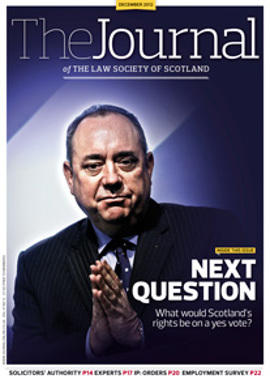President's column
The idea of the President’s column is to give an insight into his or her activities, ideas and experiences each month on behalf of Society members. The day-to-day work is a mixed bag of good, bad and sometimes ugly, and a very varied job. For good journalistic reasons, if no other, it is preferable to reflect or report on a different aspect each month.
However, there is one issue that stands out over all others for the moment, and that is criminal legal aid. I wrote about this two editions ago, and I am back again.
On 13 November I was on the demo outside the Scottish Parliament, which as far as I know was the first time Scottish solicitors had conducted a public mass protest about anything. In one discussion with Government people a few weeks before, I was asked if the issues of contribution and collection would send the profession to the barricades. I said yes, and they would send me there too. Sadly I was proved right.
But in spite of the unprecedented nature of the event, at no time did I feel any worry that this was somehow questionable or inappropriate. It was the right thing to do for the profession and indeed for the President.
I actually heard about the protest by chance, when my firm partner forwarded some rather pointed tweets asking whether I would appear or not. These had a slightly guilty-until-proved-innocent tone, which was a little unfair as no-one had actually advised me or the Society that the protest was happening. However, once I got the picture it was a no-brainer.
The demo itself was conducted in a civilised and professional way. Apart from being probably the best-dressed protest ever to attend the Parliament, we were making a political point about fairness and justice for all, and proud to be doing so. Naturally the media were interested, and with others, in particular Cameron Tait, President of the Edinburgh Bar Association, I did a rapid-fire sequence of interviews for TV, radio and newspapers, and we gave them all a flavour of the strength of our feelings as well as the logic of our position.
Afterwards I attended the Justice Committee stage 2 meeting that was the focus for the protest. The Society-suggested amendments, designed to ameliorate the provisions for the hard-pressed public and the similarly burdened profession, were cogently argued, but voted down by the Pavlovian tendency of the Government majority. That was a rather depressing spectacle, made more frustrating because at stage 1 the same committee had expressed its unhappiness with the same provisions.
United stand
I know democracy is about majorities, but it should also be about more noble and civilised values. I note with interest that the Scotsman has recently reported on unhappiness with what is seen as a controlling tendency on the part of the Scottish Government, among not just the legal profession but a variety of stakeholders and organisations.
Since then I have continued to be closely involved, through meetings with senior politicians, media interviews, and liaising with Society colleagues and bars and faculties around Scotland. The mood is grim but determined. This is not just livelihood: there are important questions of access to justice, and I am glad to see that we have at least been able to move the public on from the idea that lawyers are well-paid and have an easy life. In legal aid neither is true, but audiences and readerships need reminding that going out at 3am to the police station to see a client and then a process properly conducted is not glamorous, fun, or properly paid.
It is only a little heartening to note that I have never seen the profession so united, because that unity and co-operation is a distress purchase. But it is one of the cornerstones of our determination to fight for justice.
As I write, we are in the crucible and the outcome remains to be seen, both in the short and the longer term. The Society has a mix of responsibilities – to its members, the public and the interests of justice. We need to be able to keep talking to Government as well as oppose it when it goes too far. But it is necessary for Government to listen as well.
I am not by nature a conspiracy theorist. Here it is worse than that: there has not been enough deep thinking, and far from enough consultation with those who are most experienced in providing criminal legal services: the profession. Ideas that look good on a spreadsheet will not necessarily fly in court. And whilst our members have taken cut after cut over the years, the very fact that the contribution issue has driven them into the streets and to direct action at their own courts, should indicate to Government that there might just be merit in reconsidering.
We are there to help them reconsider. If they don’t, it is a sad day for justice in this nation.
In this issue
- Barriers to sibling contact
- Legal rights, second families and siblingship
- "I'm a chicklet and I live in a hatchery"
- And our survey says...
- No overtaking?
- Reading for pleasure
- Opinion column: Martin Morrow
- Book reviews
- Council profile
- President's column
- 2012: new starts, and challenges
- Independence before the law
- Who do you think they are?
- The expert approach
- Is all publicity good publicity?
- Turning point?
- Young and guilty
- Doubly secure
- Forced marriage: an update
- New age, new image
- A security loophole
- Quit while you're ahead
- When threats are enough
- Practice ground
- Mergers: keeping people onside
- Law reform roundup
- PI Guidelines: new edition
- Ask Ash
- Business radar






